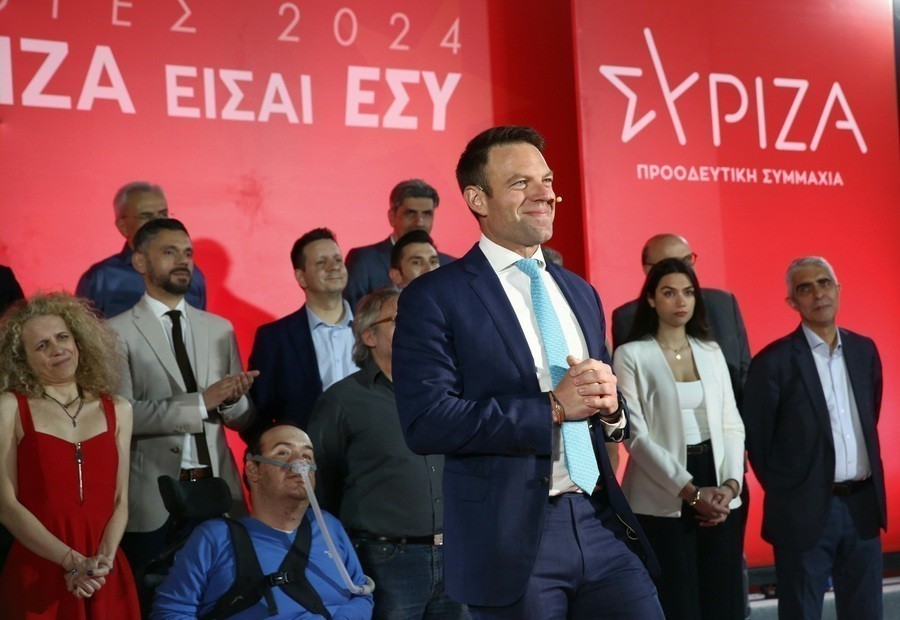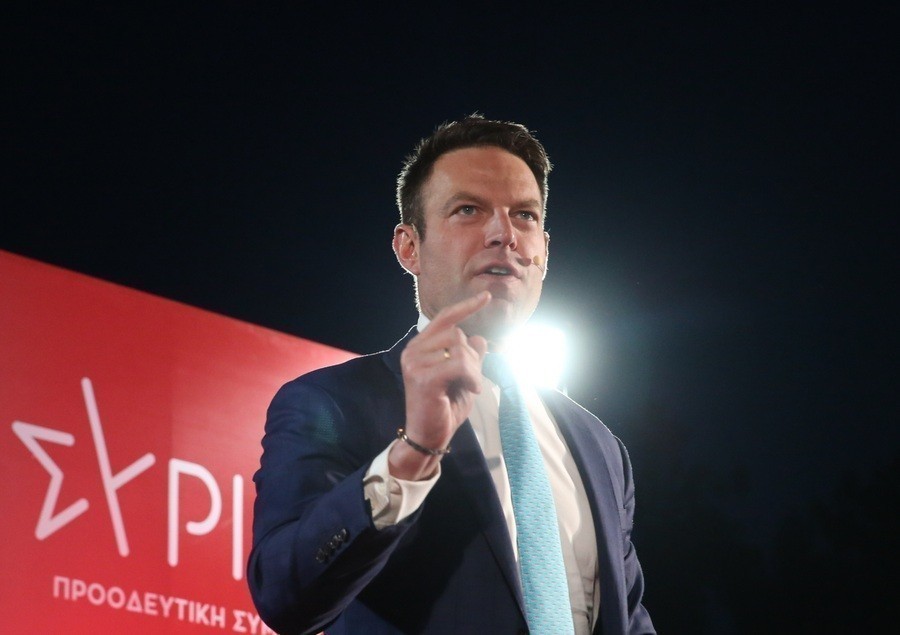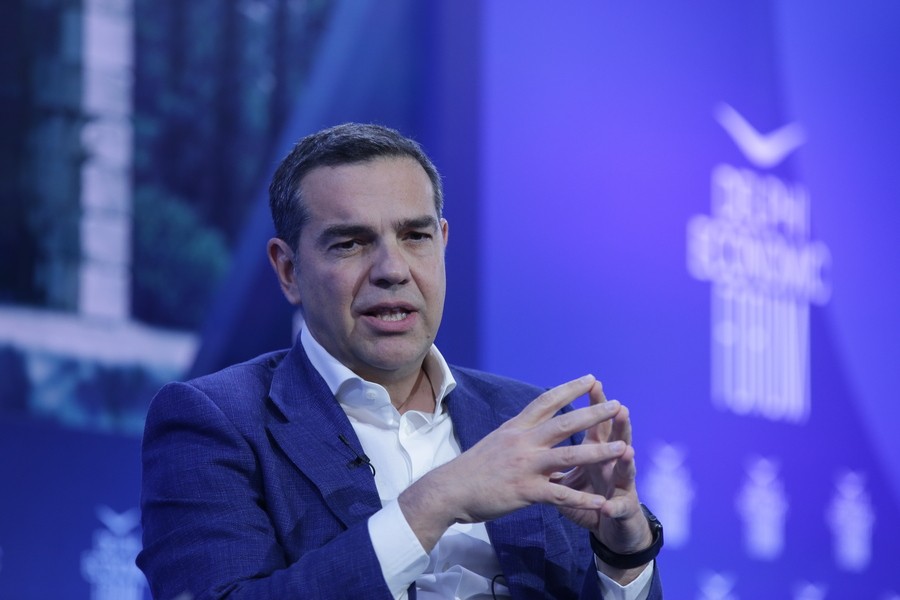
#Tags:
FYROMpension cutsΑλέξης ΤσίπραςPrime MinisterThessaloniki83rd Thessaloniki International FairplanPrespes agreementname dealOur governmnet proceeds according to plan, says prime minister Alexis Tsipras in Thessaloniki
Prime Minister Alexis Tsipras rejected criticism that his government was resorting to handouts during a press conference held at the Thessaloniki International Fair (TIF) on Sunday, and emphasised that the government was proceeding based on a plan.
“I had said since last year that in 2019 we will have the fiscal space [to do this]. On Saturday we presented our plan, our vision for Greece in the new era, and in this overall framework we included the essential relief and social support measures to alleviate the hurts and correct the injustices of the programme era,” he said in reply to an ANA question.
Tsipras noted that the relief measures he announced were a bare minimum for those that had borne a disproportionate share of the burden during the crisis years, and for the middle class. The package of measures he had announced for the next three years was balanced and not a return to the past, the prime minister added, since it would boost Greece’s pace of growth.
Highlighting the importance of the 30-billion-euro “cash buffer” agreed with Greece’s partner a year ago, Tsipras said that this ensured that Greece will not need to resort to the markets for cash in periods of high market turbulence.
“We have the luxury today to sit back and watch the turbulence in markets due to external reasons,” he said, adding that the right moment will be found to tap the markets and borrow at decent interest rates.
He also emphasised that Greece had achieved a “clean exit” from the programme without any “hidden memorandum” and was on a path of growth, having regained credibility with international actors and markets.
Asked whether pension cuts scheduled for January 1, 2019 will finally go ahead, Tsipras said that the government expected to greatly overshoot the primary surplus target of 3.5 pct of GDP, though this remained to be confirmed by the budget figures that will be collected in October.
The budget figures would be examined by the European Commission, as they were for all EU countries, and if the Greek government’s expectations were confirmed this would mean that the IMF forecasts were wrong and the cuts it had insisted on were unnecessary, Tsipras said.
“We will not restrict ourselves to these arguments only, we will add arguments that will shape our overall narrative because we do not want any ‘backward slide’ that cancels the fiscal adjustment and the core of the essential reforms. But we will explain that this measure is counter-developmental and not structural,” he added.
Questioned on his announcements about an increase in the minimum wage, Tsipras said the Federation of Hellenic Enterprises (SEV) was only one of the social partners and that the others had been more open to this proposal.
“ The process is absolutely approved in the framework of the agreements we have made with our partners before exiting the programme,” he said, adding that the process will take roughly four months and include dialogue with the social organisations, while it was also adopted by Portugal upon exiting its programme.
Regarding the next elections, Tsipras said his “ basic strategic choice” was to run to the end of his current term and the most likely scenario, since political stability was a requirement for good economic performance and he wanted to head the first government that completed its full four-year term.
He appeared confident that SYRIZA will again win the elections in October 2019 “ because it was the political force that succeeded where others had failed to lead the country out of the memorandums and to maintain conditions of balance and social protection.”
The government’s future goals included a reduction in unemployment to 10 pct in the next five years, with decent wages and working conditions, and the clearance of all state arrears to the private sector, Tsipras said, while also announcing an improvement in recently tense relations with Moscow, with an invitation to visit and meet Russian President Vladimir Putin within 2018.
On the Prespes Agreement and its importance for Greece
The Prespes Agreement signed by Greece and the Former Yugoslav Republic of Macedonia (FYROM) will be brought to the Greek parliament for ratification as planned, based on the provisions of Greece’s international obligations arising from the agreement itself and the understanding that had been reached, the prime minister said in response to questions.
“ I am absolutely convinced that a majority of Greek MPs will vote for it,” he added.
Tsipras ruled out the prospect of a referendum in Greece on the issue, saying that a holding referendum on the name and constitution of a neighbouring country would be “ historically unprecedented”. Unlike FYROM, Greece was changing neither its name nor its constitution “ so we have no reason to undertake such a proceeding,” he said, adding that the agreement will be ratified in Parliament, in the same way as all other international treaties.
Asked about Saturday’s violent protests against the Prespes Agreement in Thessaloniki, he highlighted the importance of this agreement for Greece and for Thessaloniki in particular.
“It is the inalienable right of every citizen to speak his mind freely,” the prime minister said but also noted a “qualitative difference” between the protests on Saturday and the rallies held in February. Beyond their smaller size, he said, “we saw them take colour and form from extreme elements.”
The agreement would give a substantial boost to Thessaloniki, opening up the way for the city and for northern Greece to become an engine for growth and for Greece to become a leading force in the Balkan region, he noted, while fully protecting historic legacy.
“We are watching our neighbours’ rhetoric, sometime it crosses the boundaries; we are watching and even though this is before their referendum they must not cross the boundaries but stay within the framework of all that we have agreed,” he said.
The prime minister also replied to questions about the government’s junior coalition partner, the Independent Greeks, and whether the Prespes Agreement might trigger early elections. He expressed his respect for the position and stance adopted by ANEL’s leader Panos Kammenos, while noting his complete disagreement with his views “as I have told him”. He also expressed his belief that Kammenos understand the important prospects that the agreement creates for Greece “but is bound to a position of principle”.
“But since I know him very well and we have sincere cooperation with each other, I can assure you that Panos Kammenos will not jeopardise the recovery of the economy and political stability in the country,” he added.
Main opposition New Democracy leader Kyriakos Mitsotakis, by contrast, “has not always had his current position” on the FYROM issue, Tsipras claimed, accusing the main opposition leader of “opportunism and an amoral stance”.
He also denied that the government had come under pressure from abroad to sign the deal with Skopje, noting that this had been a standing SYRIZA position over the years and of Foreign Minister Nikos Kotzias:
“I am determine to do what I consider to be in the national interest,” Tsipras added, noting that the government had seized the opportunity created by the political shift in Greece’s northern neighbour and this was welcomed by the international community because it was a step toward peace, dialogue and cooperation.
The agreement had enhanced Greece’s geopolitical role in the wider region, he added, while the government would never have given in to pressure on matters that were not in the country’s best interest.
Source: AMNA

